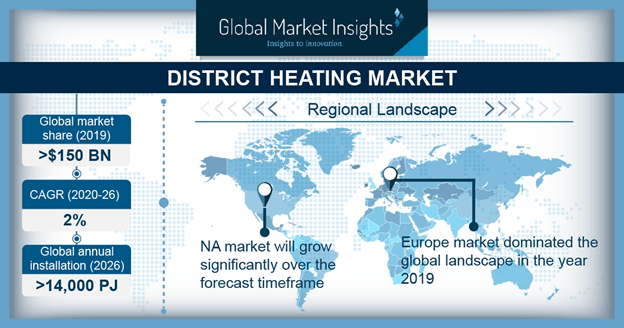District Heating Market to generate a sizable share via residential applications over 2017-2024, U.S. to be the key revenue pocket
Publisher : Fractovia | Published Date : 2017-05-05Request Sample
Shifting trends toward the adoption of sustainable energy will stimulate District Heating Market. District heating is the process of supplying hot water from one source to a group of commercial or residential complexes or to an entire district. The growing need to recycle waste energy along with the implementation of environmental norms regarding the amount of carbon content in the atmosphere will favor the market trends. The rising requirement to fulfill the surging energy requirement will also stimulate district heating industry size. According to Global Market Insights, Inc., “Worldwide district heating market, having had a revenue collection of USD 200 billion in 2016, will surpass a revenue generation of USD 280 billion by 2024.”
Europe District Heating Market Size, By Source, 2016

Numerous supportive initiatives are being implemented across various geographies to impel district heating market. For instance, the UK government has taken an initiative and introduced the heat network investment program to promote district heating industry in the region. In France, the residential application segment in district heating industry covered more than 60% of the total product installation. Residential application landscape will exhibit an annual growth rate of more than 3% over the period of 2017 to 2024. The surging product demand for industrial and residential applications across the U.S. is generating significant regional revenue. In North America, U.S. district heating industry was worth USD 20 billion in 2016. Supportive state funding, execution of strict norms to minimize the carbon emissions, and favorable initiations taken by the Federal Government to increase the number of power plant will significantly boost district heating industry share.
District heating market share for the industrial sector is expected to exhibit a tremendous growth over the years ahead. In 2016, industrial applications collected a revenue of USD 60 billion. The product offers the benefits such as safety during the gas leakage and high transmission efficiency.
Many of the industry participants are investing considerably to increase the heat generation capacity. For instance, Fortum invested in Poland to install multifuel CHP plant in 2016. Other noteworthy participants in district heating industry are SHINRYO CORPORATION, Statkraft, Göteborg Energi, NRG Energy, Ramboll, Dong Energy, STEAG, Logstor, Vattenfall, Keppel DHCS, Kelag Wärme, Fortum, KDHC, Hafslund ASA, and RWE AG.
Based on the district heating sources, CHP district heating industry is projected to record a CAGR of more than 3% over the coming years of 2017 to 2024. The attributing factor towards the industry growth are affordable operating cost, products capability to emit less amount of carbon, and an appropriate distribution network. In addition to this, the capability of high production and enhanced generation efficiency will influence the product demand notably.
Speaking of Asia Pacific district heating industry, Japan will be one of the major revenue pockets owing to the implementation norms regarding energy security along with shifting trends toward renewable energy generation across this region. To reduce the dependency on conventional energy sources, the world is trending towards the renewable energy sources such as wind, solar, and geothermal. Geothermal source segment is predicted to record an annual growth rate of more than 6% over the period of 2017 to 2024, owing to the cost competitiveness and economic feasibility.
Growing development in the commercial sector across the developing countries will boost commercial applications of district heating industry to witness a CAGR of more than 4% over the years ahead.
China district heating industry accounted for more than 10% of the global revenue share in 2016 and will register a substantial growth rate over the coming timeframe. China is investing heavily into the development of clean heating projects. Furthermore, Urban-Rural Development and Ministry of Housing are also planning to expand indoor heating zone across China, thereby stimulating the regional market.
The world is experiencing a rapid surge in Industrialization and urbanization. As per the statistics, 54% of the total world population have currently shifted base to the urban areas. This number will increase to 66% by 2050, which will lead to a huge demand for energy, propelling district heating industry size significantly over the years to come.